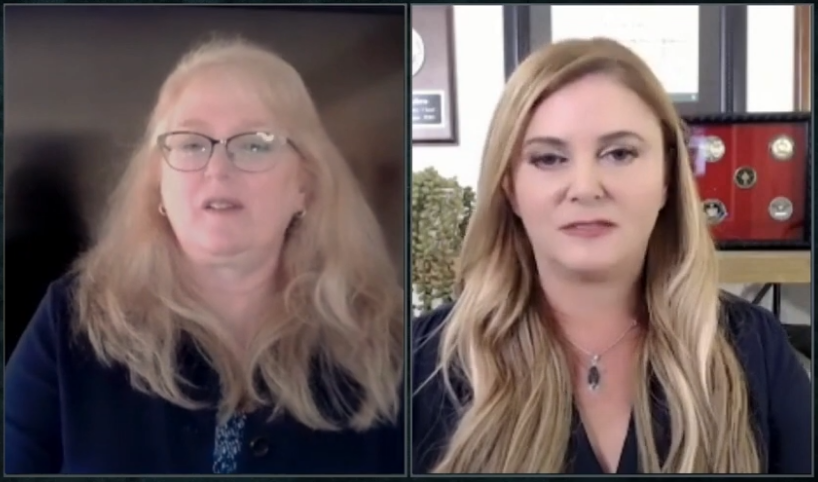 WOMEN IN TECH
WOMEN IN TECH
 WOMEN IN TECH
WOMEN IN TECH
 WOMEN IN TECH
WOMEN IN TECH
Cybersecurity specialists are in high demand, and the skills gap is in its fifth year, with the Security Certification Consortium (ISC)² Inc. reporting 4 million open positions across the globe.
Filling these roles could be an easier task if people understood the job requirements weren’t a passion for coding and cutting-edge tech, but a desire to help others and find ways to do things better.
“I want to do whatever I can to help people and to teach people to protect themselves so that they feel empowered and they’re not afraid of cybersecurity,” said Tyler Cohen Wood (pictured, right), founder and chief executive officer of MyConnectedHealth Inc.
Fellow cybersecurity professional Debby Briggs (left), chief security officer of Netscout Systems Inc., agrees. “I just always wanted to improve upon things,” she said. “If I’ve seen something that I think can do better or a product that could have something new or better in it, what excites me is to give people that feedback and to improve on what we’ve had out there.”
Briggs and Cohen Wood spoke with Lisa Martin, host of theCUBE, SiliconANGLE Media’s livestreaming studio, for a digital CUBE Conversation about why women of all ages should pursue careers in cybersecurity. (* Disclosure below.)
A lot of people assume that a cybersecurity career requires coding skills or working on artificial intelligence, but that’s not necessarily true, according to Cohen Wood.
“There are so many different avenues. There’s marketing, there’s forensics, there’s incident response … I could go on and on and on. And, oftentimes, if people don’t know that these types of jobs exist, they’re not even going to look for them,” she said.
Another common misconception is that cybersecurity requires long hours and a fixed work schedule.
“Cybersecurity is something that doesn’t have to be a nine-to-five job,” said Briggs, who recommends cybersecurity as a career for women “who may have gone the non-traditional route and got degrees later in life or took time off to raise children and want to come back to work.”
Cohen Woods agreed: “There is an untapped resource, because there’s a lot of women who are now interested in changing their careers.”
Cybersecurity is also an exciting and rapidly changing field, one in which the jobs of tomorrow don’t even exist yet, according to Cohen Woods and Briggs. This means a career in cybersecurity offers both job security and opportunities to move into different roles within the industry.
“I think that I’ve had six different major career shifts still within the cybersecurity realm. So, just because you start off doing one thing doesn’t mean that’s what you’re going to do forever,” Cohen Woods said.
Statistics show that girls opt out of technology courses as they hit their teens, which means educating them about the benefits of a cybersecurity career should start in middle school or earlier.
“It’s important for younger girls to let them know these careers are really fun and they’re extremely rewarding,” Cohen Woods stated. By “rewarding,” she is referring to both job satisfaction and financial gain.
Helping prevent cyberbullying attacks and protecting organizations from ransomware motivate Cohen Woods on a daily basis, but “there’s also a lot of money that can be made,” she stated.
According to compensation market data provider salary.com, an entry-level cybersecurity analyst in the USA earns an average yearly salary of $71,206. Add bonuses and benefits, and that figure jumps to $104,166.
While there are many reasons for women to pursue a career in cybersecurity, Briggs and Cohen Woods acknowledge that being “the only woman in the room” is challenging. Alongside encouraging more girls and women to enter the field through education, mentoring and sponsorship, the industry needs to pay attention to how it excludes women, they said.
“If you’re a high-tech company, look at your sales organization. When you go to big shows, do you pay more attention to men on the floor than women on the floor? If you have a sales event where you get different customers together, is it a golf outing or is it something that’s maybe a little bit more inclusive than just male?” Briggs asked.
Here’s the complete video interview, one of many CUBE Conversations from SiliconANGLE and theCUBE. (* Disclosure: Netscout Systems sponsored this CUBE Conversation. Neither Netscout nor other sponsors have editorial control over content on theCUBE or SiliconANGLE.)
THANK YOU